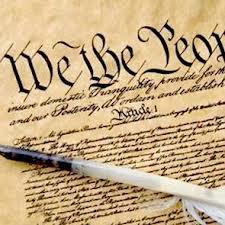
The U.S. Constitution was completed after much debate when at a point where much frustration was evident, and some delegates had left frustrated, Benjamin Franklin said in essence: If God notices the fall of a sparrow, is it likely that a nation can rise without his notice?” He then proposed that each session of the Constitutional Convention begin with prayer to seek Divine assistance. His proposal was accepted and implemented. From that time on, progress was made until the Constitution was signed and later ratified by the States.
Although the Constitution was ratified and became law, there was opposition to it. The main opposition was that the Constitution did not guarantee rights to the people. The writers and signers of the Declaration of Independence stated that rights are God-given – not of man or government. So, in order to secure ratification of the Constitution, many of the founders agreed to allow proposals of amendments immediately after ratification to secure those rights. Thus, came about the Bill of Rights (the first 10 amendments to the Constitution).
The original Constitution was meant to strengthen the power of the federal government so that certain functions necessary for a union of the States would be possible. At the same time, it was meant to restrict the power of the national government and safeguard against the concentration of power which could be abused. So, there were separations of power both vertically (people, states, and federal), and horizontally (legislative, executive, and judicial).
Because many feared that the Federal government would become too powerful, amendments were established to protect the rights of the people and the states. The First Amendment refers to the right of the people to peaceably assemble and the freedom of speech. The Ninth Amendment states: “The enumeration in the Constitution of certain rights, shall not be construed to deny or disparage others retained by the people.” The Tenth Amendment states: “The powers not delegated to the United States by the Constitution, nor prohibited by it to the States, are reserved to the States respectively, or to the people.”
The amendments, taken together with a recognition of the source of our rights, as the Declaration of Independence states (…all men… are endowed by their Creator with certain unalienable Rights…), leads us to conclude that the right to associate together and govern ourselves is fundamental. We have assumed this right in America for as long as anyone can remember. It is only now that those seeking political power for themselves at the expense of the right of association have caused us to realize that we must defend our Right of Association. Those seeking power at our expense have written and signed into law contrary to the right of association and contrary to the oath they themselves have taken to uphold the Constitution of the United States and of the State of Utah.
The law that was passed took away a right of a private party (The Republican Party of Utah) to govern itself. Specifically, the law known as SB54, sought to control the Republican Party’s right of association and to dictate how the Republican Party (and all Utah political parties) would nominate its candidates.
The Republican Party and Constitution Parties of Utah have filed suit against the State of Utah because of the Unconstitutional power grab engineered by those power-hungry politicians. The power-hungry group has become known as the “Count my Vote” group, though that name is disliked by those who want to keep the Right of Association intact. Those Constitution loving citizens have formed a group which they call “Keep my Voice. Both groups are proposing initiatives to be voted on by the Utah voters this November.
The law which takes the Right of Association and governance from private parties and places it in the hands of a powerful few sets a dangerous precedent. If they can do it in one instance, and the unconstitutional law is upheld, other private organizations can have their God-given rights (from individuals to the group) stripped, and the often-excellent purposes of those organizations subverted. Cherished organizations such as families and organized religion would be at risk.
At the end of the Constitutional Convention in 1787 when Benjamin Franklin came out on the street, a passing lady asked him, “What kind of government do we have?” His response was: “A republic if we can keep it, ma’am.” Let’s keep our Utah Republic alive and well by defending our Constitution and voting for the best candidates By so doing, we will support the Constitution and lead out for our fellow citizens in defending our God-given rights.